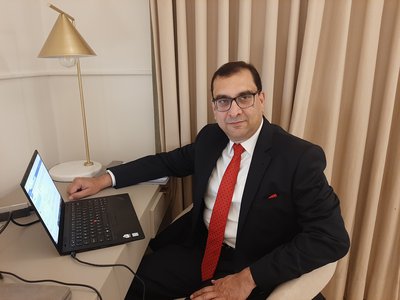11 Jan 2021
MILE Alumni Profiles: Syed Shakeel Shah
MILE was instrumental in shaping my career. Deeper understanding of law and economics of international trade helped augment my knowledge and belief in multilateral approaches to trade. Nuanced understanding of WTO system and underlying economic theory helped me contribute better in Pakistan’s policy formulation and implementation.
MILE 5 graduate Syed Shakeel Shah from Pakistan, Director of the Central Asia Regional Economic Cooperation Institute (CAREC) in Urumqi, talks about his professional journey and the benefits he gained from pursuing the MILE programme at the World Trade Institute. This interview is part of our Alumni profiles series.
Tell us about the work you are currently doing?
Currently I am working as Director in CAREC Institute, an intergovernmental organization serving as research and capacity building arm of Central Asia Regional Economic Cooperation (CAREC) Program. My job is to strategize and lead the Institute for developing range of research and capacity building activities in support of CAREC Program and meet the requirements of the member countries.
CAREC is an Asian Development Bank-led multilateral program aiming to accelerate the process of development through cooperation, leading to accelerated economic growth and poverty reduction. Program has so far mobilized investments of over US $ 39.2 billions for 208 projects in 11 member countries (Afghanistan, Azerbaijan, People’s Republic of China, Georgia, Kazakhstan, Kyrgyz Republic, Mongolia, Pakistan, Tajikistan, Turkmenistan, and Uzbekistan) . CAREC Institute has facilitated this process through research and capacity building events on range of topics like WTO trade facilitation agreement implementation, E-Commerce , Sanitary and Phytosanitary Regulations, improving border crossing services, promoting economic diversification in the CAREC region, enhancing quality of key economic indicators, road asset management; road safety engineering, reforming state-owned enterprises, regional tourism promotion, energy security, and food safety etc.
Institute has also developed CAREC Regional Integration Index (CRII) which measures extent of regional integration in six dimensions, and is now working with ADB on Corridors Performance Measurement and Monitoring Report, an empirical tool which measures efficiency along various trade corridors in the region in terms of time, cost and speed of cargo movement.
With the unexpected onset of COVID19 pandemic, CAREC Institute developed series of policy briefs related to COVID19 themes. Additionally, Institute is conducting research on topics like impact of COVID19 on SMEs and Tourism sector in the region, and on possible challenges to large scale vaccination programs. This will help governments in member countries in devising and adjusting public policies to deal with health pandemic and economic downturn.
What did you do before the MILE, and what was your career path after you graduated?
Before MILE , I was working with Government of Pakistan as a Customs officer, primarily tasked with regulation of international trade, with a strong revenue and protectionist approach. Even though I continued working with Government after doing MILE , there was a significant shift in my approach and career path. Greater understanding of economics and the background to various WTO agreements helped me developed a better understanding of new global economy, based on greater interdependence and connectivity. Belief in international trade as a driver of growth and development requires major shift in approaches of developing countries. MILE experience enabled me to work and contribute in major policy positions, like Economic Affairs section of Prime Minister’s Office where I was able to contribute in major policy matters like trade policy , regional integration, WTO ministerial briefs etc.
MILE qualification also helped me expanding my career as I was selected to head an Intergovernmental Organization (CAREC Institute) working for regional economic integration .
How do you think the MILE helped you in your career?
MILE was instrumental in shaping my career. Deeper understanding of law and economics of international trade helped augment my knowledge and belief in multilateral approaches to trade. Nuanced understanding of WTO system and underlying economic theory helped me contribute better in Pakistan’s policy formulation and implementation. It helped me advocating multilateral approaches and liberalization agenda in internal policy dialogues. I was able to contribute in the preparation of various categories of commitments for Pakistan for Trade Facilitation Agreement. Similarly, I contributed to Pakistan’s position paper for WTO ministerial (Nairobi and Buenos Aires). I participated in WTO Workshop “ How to Support MSMEs: Sharing of National, Regional and Multilateral Experiences (October - 1 November 2017) in Geneva. Beside sharing national experience, I also served as panelist for the final session. I also participated in preparation of Pakistan’s offer list for Trade in Services Agreement and attended Advanced Course on Trade in Services in WTO in 2016 .
MILE degree was also instrumental in my selection for the current assignment as head of an iter-governmental organization dealing with Regional Cooperation and Integration (RCI) .
Any advice for current students?
Students today are witnessing a very unsettled global economic milieu . Last few years have seen upsurge in trade rivalries among major trading partners. Amongst many others, one of the casualty has been rule based trading system. With its hallmark Dispute Resolution system dysfunctional, and states resorting to unilateral trade restrictive actions , global trading system is facing its toughest test since establishment of WTO. Economic downturn and trade disruption caused by COVID19 has caused lingering uncertainties and long shadows on global trade and economics. Nationalist and non-inclusive vaccination programs and policies will further erode trust in multilateral approaches. In addition to all above , the mega trends like onset of 4th industrial revolution can cause major disruptions in economies, trade and employment . All this will have profound implications for global trade and economy. MILE students will have to stay abreast of these developments, and direct their intellectual efforts for restoring belief in multilateral system while bringing equitable development on the forefront of global trade agenda .
Further info
MILE Alumni Profiles series


